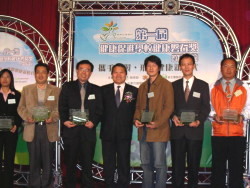First Cornerstone Award Ceremony for Health-Promoting Schools

Through the intensive efforts of the Ministry of Education, the Department of Health and the Bureau of Health Promotion, in the 2005 academic year there were 318 elementary and secondary schools and in the 2006 academic year, 516 elementary and secondary schools that dealt with the issues of smoking, betel nut chewing, physical fitness and nutrition. The expectation is for the concepts and practices of health-promoting schools to be promoted among individuals, schools and communities, thereby spreading to all of Taiwan's citizens.
The title of this ceremony is "The Health Cornerstone Awards". Representatives ranging from the central government to schools, communities, heads of households and other groups all have been cornerstones for this effort as selfless contributors to the program for health-promoting schools. In fact, these people, through their resolution to implement the project, have all been the leaders of the program for health-promoting schools. The expectation is that in the future more schools and communities will be attracted to invest their resources in establishing a healthy learning environment in Taiwan.
According to Vice Minister of Education Chou Tsan-der, the program for health-promoting schools is a fundamental project that will, in terms of government policy, the environment and technology, transform knowledge about health into action and realize healthy living through the building and establishment of good community relations. By holding the first cornerstone award ceremony for health-promoting schools, all people can resolve to join hands and march forward, which also symbolizes the spirit and goal of joining hands simultaneously with the rest of the world.
In addition to an increase in the number of participating schools, the program for health-promoting schools will also have an overall effect on quality issues in the following five ways.
- System
Adjustments in the school system, regulations and habits will be made in order to foster healthy lifestyles. - Environment
Efforts to create a healthy environment in schools include improvements in lighting, noise control, greening of the environment and cultural changes to include both material and qualitative aspects. - Education
The health agenda is being incorporated into school schedules and curricula. - Services
Integration of community medical resources is enabling the provision of campus services, establishment of health data for students and follow-up care for health abnormalities among students. - Community Relations
Schools and communities are working together to organize sport competitions, set up health breakfast shops, provide maps for safe routes to and from schools and coordinate with parents for support.
The program for health-promoting schools, in addition to improvements in quantity and quality, has seen initial results in fostering healthy lifestyles. At Shenkeng Elementary School in Taipei County, 84% of the pupils expressed a willingness to persuade family members to quit smoking and the school implemented a"zero smoking hazard" on its campus. Under a healthy diet scheme, 98% of the students from the first to fourth grades and 90% of the students in the fifth and sixth grades started eating breakfast. Under the program for health-promoting schools, Yu Ying Elementary School in Changhua County saw the percentage of students joining outdoor activities between classes increase to 85%, while accident rates dropped. The injury rates on athletic fields fell from 52.34% to 49.03%; the same rate for classrooms dropped from 20.88% to 19.56%. The rate of injury caused by sports equipment declined from 16.5% to 5.78%. At Gongguan Elementary School in Yilan County the incidence of tooth decay in 12-year-olds dropped from 92.59% in 2002 to 84.09% in 2005. The rate for successful treatment of decayed permanent teeth climbed from 59.4% in 2002 to 98.89% in 2005.
Attachment(s) for download
- Chinese textChinese text.doc
